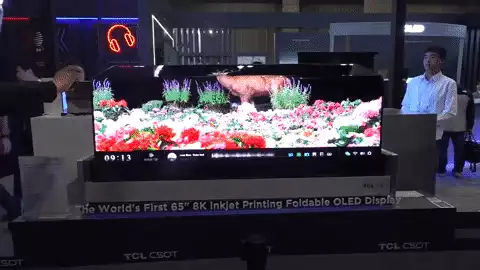The world of OLED TVs is always innovative. Recently, there have been rumors of transparent OLED displays and energy-efficient PHOLED displays. And now a foldable 8K display is joining the fray.
At SID Display Week 2023, TCL CSoT showed off a truly impressive foldable 8K OLED TV (h/t OLED-info). According to TCL CSoT, it features a refresh rate of 120 Hz and an impressive response time of 1 ms.
However, the bendable nature is the only major innovation of this display. However, this is also an inkjet-printed OLED display, a new manufacturing process in the OLED display market.
While this foldable TV may never make it to market (this TV is just a prototype), inkjet-printed OLED displays may be available as early as 2024 According to TCL CSoT, inkjet OLED production is expected to begin this year. According to TCL CSoT, production of inkjet OLEDs will begin this year, but mass production will not be possible until next year at the earliest.
OLED inkjet printing is an innovative new way to produce display panels; according to OLED-info, current OLED production requires a deposition process in which organic materials (the "O" in OLED) are placed on a glass sheet through a thin metal stencil. The problem with this process is that it is relatively wasteful, wasting organic material and exposing the glass to dust from stencil changes. This leads to lower yields and higher costs for display manufacturers.
Inkjet printing eliminates the stencil altogether and allows the organic material to be printed directly on the glass sheet. This significantly increases display manufacturers' yields because there is less waste of organic materials and less chance of glass panel breakage.
The process is potentially so beneficial that nearly every display manufacturer is attempting to successfully implement an inkjet printing process for OLED displays. Unfortunately, however, the process is very difficult to successfully implement, and printed OLED materials are less effective than their vapor-deposited counterparts. Because of its limitations, the technology is currently limited to large TV panels and cannot be used for phones, VR headsets, or wearables.
Hopefully, however, TCL will succeed in cracking that code; TCL initially debuted inkjet OLEDs in 2021 and now has a foldable version of the same 65-inch display. At SID this year, they also debuted a 14-inch rollable 4K OLED panel, a 31-inch rollable 4K OLED panel, and a 17-inch foldable OLED panel; if TCL can pull this off, it will significantly lower the cost of OLED production.










Comments